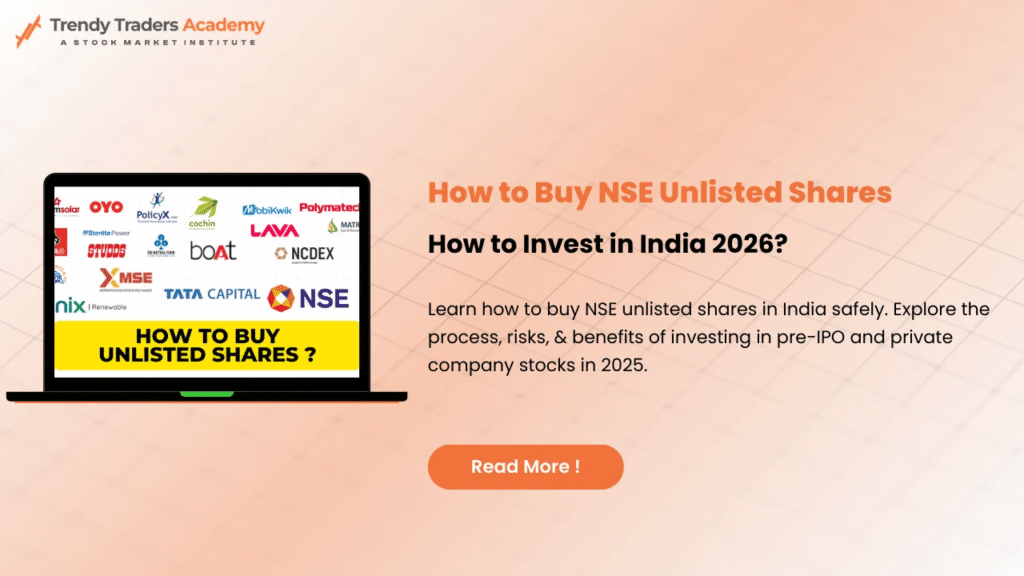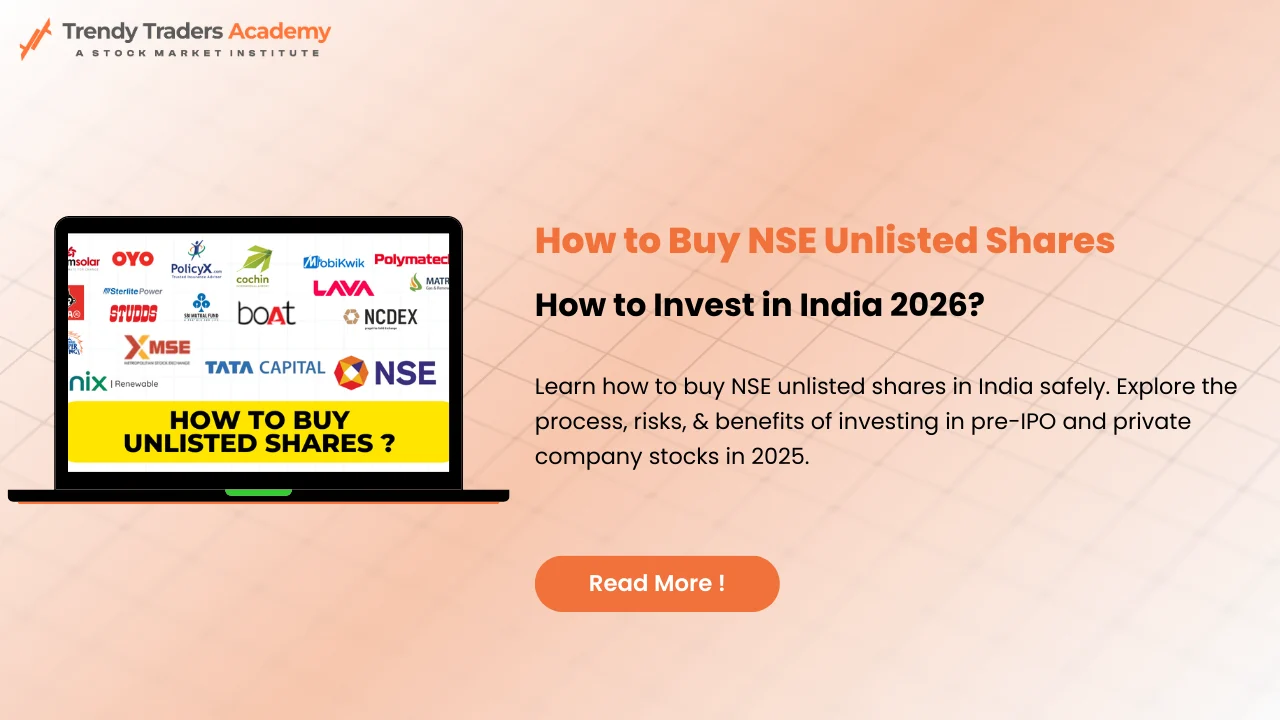nse share price unlisted
How to Buy Unlisted Shares: A Complete Beginner-Friendly Guide
Buying unlisted shares sounds exciting, right? But for most people, it also feels confusing—like entering a shop without price tags. You know the items are valuable, but you’re unsure how to buy them or whether they’re even real.
That’s exactly why I created this guide.
In this 3000-word, easy-to-understand article, you’ll learn how to buy unlisted shares, where to find them, what risks you must avoid, and how Online Stock Market Courses can help you make smarter decisions. Think of this guide as your personal roadmap—simple, transparent, and written exactly the way I would explain it to a friend.
Learn how to buy unlisted shares safely. Beginner guide on Unlisted Shares and benefits of Online Stock Market Courses. Simple, clear & helpful.
Introduction to Unlisted Shares
Unlisted shares are becoming popular in India, especially among people who want to invest early in companies before they list on the stock market. But the process of buying them isn’t as straightforward as buying listed stocks on NSE or BSE.
This guide will simplify everything for you—from what unlisted shares are to the safest way to purchase them.
What Are Unlisted Shares?
Unlisted shares are the shares of companies that are not traded on stock exchanges like NSE or BSE.
Think of listed companies as restaurants on Zomato—everyone can find them easily, prices are visible, reviews are available.
Unlisted companies, on the other hand, are like local hidden-gem restaurants—great food, huge potential, but not easily accessible to everyone.
Examples of popular unlisted companies:
- Tata Technologies (before IPO)
- Oyo
- Reliance Retail
- HDB Financial Services
- National Stock Exchange (NSE)
Investors buy these shares hoping the company will:
- List on the stock exchange
- Grow in valuation
- Provide massive early-stage returns
Why Do People Buy Unlisted Shares?
Here are the biggest reasons:
1. Early Entry Advantage
Buying shares before IPO often gives investors multibagger potential if the company performs well.
2. Access to High-Growth Companies
Some of India’s upcoming giants are still unlisted.
3. Portfolio Diversification
Unlisted shares provide exposure beyond the regular stock market moves.
4. Better Valuation Opportunities
Sometimes the price of unlisted shares is far lower before IPO.
How to Buy Unlisted Shares – Step-by-Step
Let’s break it down in the simplest possible way:
Step 1: Choose a Trusted Platform or Dealer
Since unlisted shares aren’t traded publicly, you must choose a reliable source.
Step 2: Check the Company’s Financials
Look for the basics:
- Revenues
- Profit
- Growth potential
- Recent valuations
Step 3: Confirm Availability & Price
The price varies based on demand, supply, and company performance.
Step 4: Complete KYC & Payment
You’ll need:
- PAN
- Aadhaar
- Demat account details
Step 5: Shares Get Delivered to Your Demat
It may take a few days depending on the seller and the transfer process.
Where to Find Genuine Unlisted Shares
Here are the safest sources:
1. SEBI-Registered Brokers
These offer the highest safety and transparency.
2. Online Unlisted Share Platforms
Platforms that specialize in pre-IPO and unlisted shares.
3. Employees Selling ESOPs
Many employees sell their company shares directly.
4. Private Equity Deals
High-net-worth investors sometimes sell stakes privately.
Methods to Buy Unlisted Shares (Explained)
1. Pre-IPO Market
For companies preparing for IPO.
2. ESOP Market
Buying shares directly from employees.
3. Private Placements
Dealers connect investors with share sellers.
4. Alternative Investment Platforms (AIPs)
Fintech platforms that curate pre-IPO opportunities.
5. Grey Market
Not advisable for beginners—high risk.
Risks You Must Know Before Buying
Buying unlisted shares comes with risks. Here are the major ones:
1. Liquidity Risk
Selling your shares may take time.
2. No Guaranteed Listing
Some companies may delay IPO indefinitely.
3. Price Volatility
Prices vary drastically because there is no regulated market.
4. Fraud Risk
Fake shares or unreliable sellers could cause losses.
5. Regulatory Restrictions
Minimum lock-in period applies after IPO for some shares.
How to Verify the Seller & Shares
Here’s a small checklist for safety:
- Check if the platform is SEBI-registered
- Ask for the company’s latest financials
- Request a “Client Master Report” (CMR copy) from the seller
- Verify share ISIN
- Ensure payment is made through bank only (no cash)
- Cross-check the demat details
Your investment is safe only when the shares reach your demat account.
Documents Required to Buy Unlisted Shares
You’ll need:
- PAN
- Aadhaar
- Bank account
- Demat account
- Cancelled cheque
- KYC documents (self-attested)
Price Discovery – How Unlisted Shares Are Priced
Unlisted share prices depend on:
1. Company performance
Financial strength impacts valuation.
2. Demand & Supply
If demand is high, prices increase.
3. Market Sentiment
Upcoming IPO hype impacts the price.
4. Past Fundraising Rounds
Investors look at the latest valuation of the company.
There is no fixed price, which is why research is important.
Taxation on Unlisted Shares
Unlisted shares are taxed differently from listed shares.
Short-Term (held < 24 months):
Taxed as per your income slab.
Long-Term (held > 24 months):
20% tax with indexation benefit.
SEBI Rules You Should Know
- Lock-in of 6 months after IPO for pre-IPO shares
- Shares must be transferred only through Demat
- KYC is mandatory
- Payments should be traceable and bank-to-bank
Common Mistakes Beginners Make
1. Buying Without Research
Don’t rely on hype.
2. Choosing Unverified Sellers
Always verify before paying.
3. Expecting Quick Returns
Unlisted shares require patience.
4. Not Understanding Liquidity
Selling may take time.
5. Not Taking Online Stock Market Courses
This is the biggest mistake—lack of financial education ruins investments.
How Online Stock Market Courses Can Help
Online Stock Market Courses are extremely helpful for beginners because they teach:
- How to read financial statements
- How valuations work
- How to choose good unlisted companies
- Risk management
- How IPO pricing works
Learning first will help you invest confidently and avoid common mistakes.
Final Verdict – Should You Buy Unlisted Shares?
The answer is YES—but only if:
- You understand the risks
- You invest through trusted platforms
- You research the company
- You have patience
Unlisted shares can be life-changing investments, but only with the right approach and knowledge.
Conclusion
Buying unlisted shares is like discovering diamonds before they reach the jewellery shop—high potential but requires careful inspection. Now that you know how to buy unlisted shares safely, where to find them, how to verify sellers, and how Online Stock Market Courses can help, you’re more prepared than most beginners.
Start small, stay informed, and invest wisely.
FAQs
1. Is it legal to buy unlisted shares in India?
Yes, buying unlisted shares is completely legal if done through verified platforms.
2. Do I need a demat account to buy unlisted shares?
Yes, shares are transferred directly into your demat account.
3. What is the minimum investment in unlisted shares?
Depending on the company, it can start from ₹5,000 to ₹50,000.
4. How long does it take to receive unlisted shares in my demat?
Usually 2–5 working days.
5. Are unlisted shares safe to buy?
They are safe if you buy from verified sellers and understand the risks involved.



